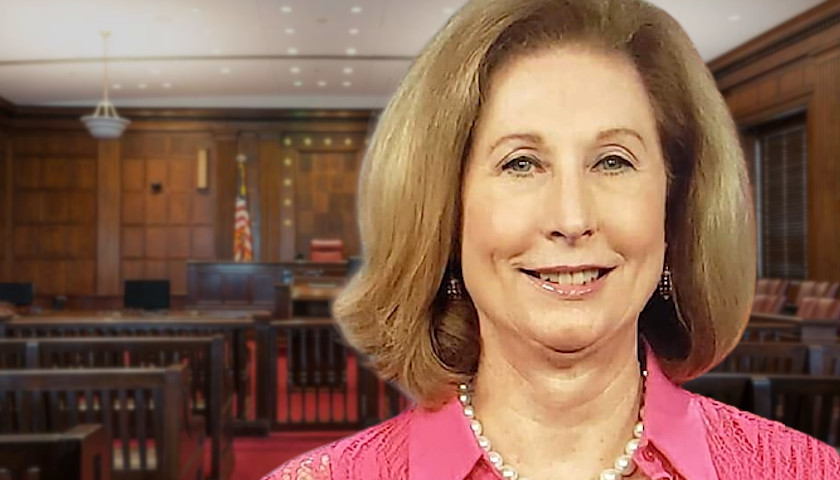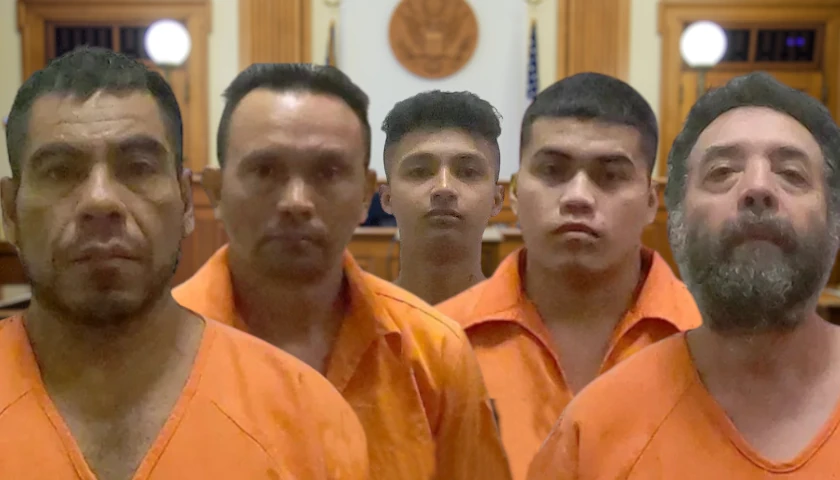Former federal prosecutor Sidney Powell, who brought four lawsuits challenging the results of the 2020 election, was cleared of charges from the State Bar of Texas by the Texas Court of Appeals this month.
The court ruled in a 24-page opinion upholding the trial court that the Texas Bar’s Commission for Lawyer Discipline failed to show how she engaged in “dishonesty, fraud, deceit, or misrepresentation” in lawsuits she filed challenging former President Donald Trump’s presidential loss.
The lower trial court found that the evidence against Powell (pictured above) granted no-evidence summary judgment for her against the Texas Bar, which the bar appealed. The higher court criticized the Texas bar, “The Bar employed a ‘scattershot’ approach to the case, which left this court and the trial court ‘with the task of sorting through the argument to determine what issue ha[d] actually been raised.’”
The court said Powell’s “lawsuits alleged a vast election fraud conspiracy involving U.S. Dominion, Inc. (‘Dominion’), a company that manufactures voting machines, foreign actors, state and party officials, and county elections workers.” The Texas Bar alleged that two of Powell’s exhibits had been altered. The court said, “Specifically, the Complaint described these exhibits as undated, and the copies attached were undated, but the documents were in fact dated.
The court said two of the exhibits were “copied in landscape rather than portrait mode,” which is why the dates were cut off. Powell said she did not draft the complaint or download and attach the exhibits, relying on other counsel. She also said the date or signature on the certificate was in the public record, so “not an issue, and an ‘indisputable fact.’”
The court said it would affirm a summary judgment if “there is a complete absence of evidence of a vital fact,” “the evidence offered to prove a vital fact is no more than a mere scintilla,” or one of a couple of other reasons.
The Texas Bar claimed that Powell “knew of the falsity of the evidence she presented and did nothing to correct the same” when she referenced an exhibit filed by the Texas Bar, Exhibit (E), instead of another, Exhibit (G). The court disagreed, stating, “The Bar offers no explanation of the purported significance of the exhibit and supplies no authority to suggest that an opposing party’s arguments and allegations have any cognizable relationship to the claims asserted against Powell.”
The court pointed out that the Texas Bar was guilty of doing the same thing it went after Powell for allegedly doing.
“By its own admission, the Bar misidentified or failed to include multiple exhibits it claims to have relied on in its Second Amended Response,” the opinion said.
“The deficiencies go far beyond mislabeling exhibits,” the opinion added.
The court listed many more issues with the exhibits, including that “the Bar not only failed to cite to or argue about any additional documents — the documents are not mentioned at all.”
Regarding whether Powell knew whether one of her exhibits had a date on it, the court said that “there is no competent summary judgment evidence that Powell had actual knowledge that the pleading included false information.” The opinion went on, “Although the Bar characterizes Exhibit F as ‘doctored,’ and ‘altered,’ there is no competent summary judgment evidence to establish the accuracy of these characterizations or to demonstrate that Powell knowingly made a false statement about the exhibits.”
The Texas Bar accused Powell of ethics rules typically used against conservative attorneys. One was Disciplinary Rule 8.4(c), “A lawyer shall not engage in conduct involving dishonesty, fraud, deceit, or misrepresentation.” The court acknowledged that “the rules do not define ‘dishonesty,’ ‘deceit,’ or ‘misrepresentation.’”
The justices refused to follow the Texas Bar’s expansive rule interpretation.
“We are troubled by the Bar’s implicit suggestion that application of the ordinary meaning of the term dishonesty means the DR encompasses imprecise pleadings and carelessly filed exhibits,” they said. “Regardless of whether the challenged conduct must be knowing, intentional, or otherwise, a question we need not resolve here, it is axiomatic that dishonesty involves some conscious perversion of truth.” They went on, “As common sense dictates, and the case law illustrates, dishonesty involves something more than carelessness or inadvertent conduct.”
Powell was one of 19 defendants, along with Trump, in Fulton County District Attorney Fani Willis’s RICO prosecution related to the 2020 election. She pleaded guilty to six misdemeanor counts related to election interference, which will be eliminated from her record completely after she serves six years of probation. Dominion and Smartmatic have pending defamation lawsuits against her.
Fox News settled a defamation lawsuit from Dominion for $787.5 million. Dominion asserted that several people made defamatory statements on air about the company and election fraud, including Rudy Giuliani, Powell and Lou Dobbs.
In Judge Eric M. Davis’s ruling on the parties’ motions for summary judgment, he indicated that he would instruct the jury that they must consider those statements false. “The evidence developed in this civil proceeding,” he said, “demonstrates that it “is CRYSTAL clear that none of the statements relating to Dominion about the 2020 election are true.”
The Texas Bar has also targeted other conservative attorneys, including Texas Attorney General Ken Paxton. The Texas Bar issued sanctions against him over his efforts to challenge irregularities in the 2020 election, which he appealed to the Texas Supreme Court.
– – –
Rachel Alexander is a reporter at The Arizona Sun Times, The Tennessee Star, and The Star News Network. Follow Rachel on Twitter / X. Email tips to [email protected].
Photo “Sidney Powell” by Sidney Powell.




